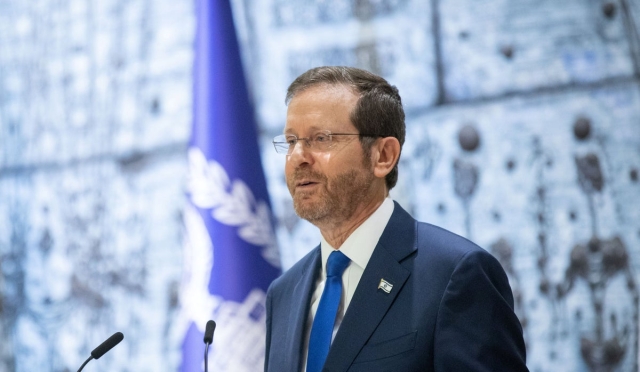The opponents of the legal reforms of Justice Minister Yariv Levin and Prime Minister Binyamin Netanyahu have had their eyes on President Yitzhak Herzog in recent days. The many demonstrators last Saturday night even shouted insults against the president, and expect him to take action using the fact that he was a political opponent of Netanyahu in the past as their rationale.
Some even suggested that he should not sign the laws that will be passed as part of the emerging reform, but it should be noted that this is only a technical procedure and the president has no discretion as to whether to ratify the laws of the Knesset. In Israel, the role of the President is largely ceremonial, legislation is passed through the Knesset and approved by the Prime Minister.
#Israel : ‘We are in the midst of a deep controversy that is tearing the nation apart’ - in statement, President Herzog says Israel is facing a “historic constitutional⁰crisis" over the radical judicial reform plan proposed by #Netanyahu new government pic.twitter.com/Vx0SP2D18s
— sebastian usher (@sebusher) January 15, 2023
According to Israeli reporting late Monday, as part of the president's non-political mediation attempts between the parties, he met with Netanyahu privately last week. In addition, it was reported that the president held a similar meeting with Supreme Court President Ester Hayut. Herzog is expected to meet with opposition leader Yair Lapid as well. Besides those meetings, Herzog spoke several times by phone with Netanyahu and Hayut, and sources in the know said there was a willingness on both sides to attend a joint meeting.
In the past, presidents have expressed their displeasure at laws enacted by the Knesset, and the most recent example is from 2012 when former President Shimon Peres harshly attacked legislation to change the composition of the Supreme Court and increase damages in defamation lawsuits, which he perceived as “laws of silencing”. Peres was even quoted at the time as saying: "I am personally ashamed that they are trying to pass such laws. The people who are responsible for this are doing themselves and the country an injustice."
Israel has been kidnapped by Netanyahu's new government.
— Yael Yem (@YYaelush) January 16, 2023
European Jewish leaders should speak up loud and clear about the destruction of Israel democracy
The legal situation in Israel, it is important to clarify, does not require the President's signature as a condition for a law enacted to enter into force. The president also does not have a veto on laws passed by the Knesset, and a law enters into force upon its publication in the records, unless otherwise stated.
Herzog, who has followed his father’s footsteps into the presidency, is attempting to create a discourse that will lead to broad agreement on the issues included in Levin's judicial plans. However, he does not intend to present a presidential document that will bridge the parties, and senior members of the opposition also admitted yesterday that despite the protesters' expectation of Herzog to intervene, his room for maneuver is reduced to the point of nothing, being in such an official, non-political position.
#Israel : ‘We are in the midst of a deep controversy that is tearing the nation apart’ - in statement, President Herzog says Israel is facing a “historic constitutional⁰crisis" over the radical judicial reform plan proposed by #Netanyahu new government pic.twitter.com/Vx0SP2D18s
— sebastian usher (@sebusher) January 15, 2023
The chairman of the Labor Party, Merav Michaeli, for example, said Monday morning at the beginning of the faction meeting that he is not a "political party" and is therefore "above this event." According to her, "it is impossible to judge him, And yet I trust him." The President participates in formal ceremonies and official visits in Israel and abroad as a State representative.
The President of the State is elected by the Knesset in a secret ballot for one seven-year term. Typically, lawmakers who have made an impact in Israeli society are chosen, it is often seen as the last stop in the career for notable politicians. Herzog is relatively young for the post, having been elected in 2021 when he was only 61 years of age.


